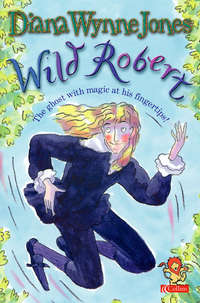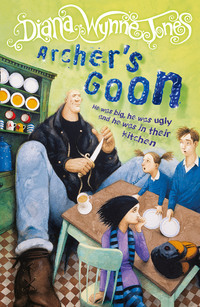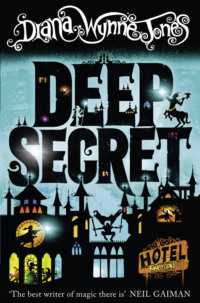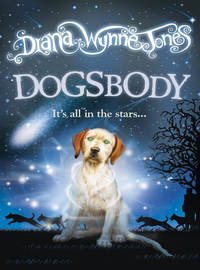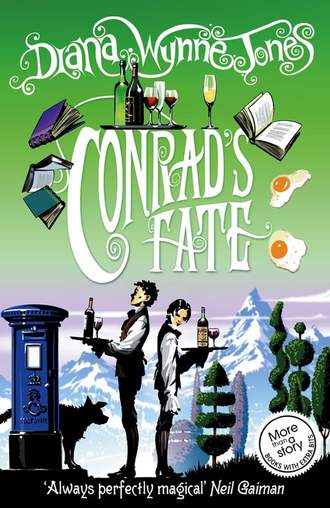
Полная версия
Conrad’s Fate
All these men had shrewd respectable faces and expensive clothes, which made it worse that they were all staring at me with concern. Mayor Seuly sipped at his wine and shook his head a little. “Not long for this life unless something’s done soon,” he said. “What’s causing it? Does anyone know?”
“Something – no, someone he should have put down in his last life, by the looks of it,” Mr Hawkins the tailor said.
The tall land-owning one nodded. “And the chance to cure it now, only he’s not done it,” he said, deep and gloomy. “Why hasn’t he?”
Uncle Alfred beckoned me to stop standing staring and put the bottles on the table. “Because,” he said, “to be brutally frank with you, I’ve only just found out who he should be dealing with. It’s someone up at Stallery.”
There was a general groan at this.
“Then send him there,” said Mr Fellish.
“I am. He’s going next week,” my uncle said. “It couldn’t be contrived any sooner.”
“Good. Better late than never,” Mayor Seuly said.
“You know,” observed Mr Priddy, “it doesn’t surprise me at all that it’s someone up at Stallery. That’s such a strong Fate on the boy. It looks equal to the power up there – and that’s so strong that it interferes with communications and stops this town thriving as it should.”
“It’s not just this town Stallery interferes with,” Mayor Seuly said. “Their financial grip is down over the whole world, like a net. I come up against it almost every day. They have magical stoppages occurring all the time, so that they can make money and I can’t. If I try to get round what they do – bang. I lose half my profits.”
“Oh, we’ve all had that,” agreed Mr Goodwin. “Odd to think it’s in this lad’s hands to save us as well as himself.”
I stood by the table, turning from one to the other as they spoke. My mouth went drier with each thing that was said. By this time I was so horrified I could hardly swallow. I tried to ask a question, but I couldn’t.
My uncle seemed to realise what I wanted to know. He turned round. He was holding his glass up to the light, so that a red blob of light from it wavered on his forehead as he said, “This is all very true and tragic, but how is my nephew to know who this person is when he sees him? That’s what you wanted to ask, wasn’t it, Con?” It was, but I couldn’t even nod by then.
“Simple,” said Mayor Seuly. “There’ll come a moment when he’ll know. There’s always a moment of recognition in cases of karma. The person he needs will say something or do something, and it will be like clicking a switch. Light will come on in the boy’s head and he’ll know.”
The rest of them nodded and made growling murmurs that they agreed, it was like that, and Uncle Alfred said, “Got that, Con?”
I managed to nod this time. Then Mayor Seuly said, “But he’ll want to know how to deal with the person when he does know. That’s quite as important. How about he uses Granek’s Equation?”
“Too complicated,” said Mr Goodwin. “Try him with Beaulieu’s Spell.”
“I’d prefer a straight Whitewick,” Mr Loder the butcher said.
After that they all began suggesting things, all of which meant nothing to me, and each of them got quite heated in favour of his own suggestion. Before long, the tall, land-owning one was banging his wineglass on the little table beside his chair and shouting, “You’ve got to have him eliminate this person for good, quickly and simply! The only answer is a Persholt!”
“Please remember,” my uncle said anxiously, “that Con’s only a boy and he doesn’t know any magic at all.”
This caused a silence. “Ah,” Mayor Seuly said at length. “Yes. Of course. Well then, I think the best plan is to enable him to summon a Walker.”
At this, all the others broke into rumbles of “Exactly! Of course! A Walker. Why didn’t we think of that before?”
Mayor Seuly looked round the circle of them and said, “Agreed? Good. Now what can we give him to use? It ought to be something quite plain and ordinary that no one will suspect…Ah. Yes. A cork from one of those bottles will do nicely.”
He held out his hand with a handsome gold ring shining on it and Mr Loder passed him the purple stained cork from the bottle he had just emptied into a decanter. Mr Seuly took it and clasped it in both hands for a moment. Then he nodded and passed it on to Mr Johnson, who did the same. The cork slowly travelled round the entire circle, including Uncle Alfred and Mr Loder standing by the table, who passed it back to the Mayor.
Mayor Seuly held the cork up in his finger and thumb and beckoned me over to him. I still couldn’t speak. I stood there, looking down on his wealthily clipped hair, that almost hid the thin place on top, and wondering at how rounded and rich he looked. I breathed in smells of nutty, fruity wine, smooth good cloth and a tang of aftershave, and nodded at everything he said.
“All you have to do,” he said, “is first to have your moment of recognition and then to fetch out this cork. You hold it up like I’m doing, and you say, ‘I summon a Walker to bring me what I need’ Have you got that?” I nodded. It sounded quite easy to remember. “You may have to wait a while for the Walker,” Mayor Seuly went on, “and you mustn’t be frightened when you see the Walker coming. It may turn out bigger than you expect. When it reaches you, the Walker will give you something. I don’t know what. Walkers are designed to give you exactly the tool for the job. But take my word for it, the object you get will do just what you need it to do. And you must give the Walker this cork in exchange. Walkers never give something for nothing. Have you got all that?” he asked. I nodded again. “Then take this cork and keep it with you all the time,” he said, “but don’t let anyone else see it. And I hope that when we next meet you’ll carry no karma at all.”
As I took the cork – which felt like an ordinary cork to me – Mr Johnson said, “Right. That’s done. Send him off, Alfred, and let’s start the meeting.”
I didn’t really need Uncle Alfred to jerk his head at me to go. I got out as quickly as I could and rushed upstairs to the kitchen for a drink of water. But by the time I got there, my mouth was hardly dry at all. That was odd, but it was such a relief that I hardly wondered about it. I wasn’t even very scared any more, and that was odd too, but I didn’t think of it at the time.
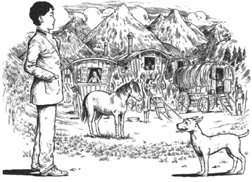
Chapter Four
I got much more nervous as the week marched on. The worst part was the end of term assembly, when I had to sit on the left side with the school leavers, while all my friends sat across the gangway because they were going to Upper Schools. I felt really left out. And while I sat there, I realised that even when I’d found the karma person and got rid of him, I’d still be a year behind my friends at Stall High. And on my side of the gangway, the boy next to me had got a job at Mayor Seuly’s ironworks and the girl on the other side was going to train as a maid in Mr Goodwin’s house. I still had to get my job.
Then it suddenly hit me that I was going off on my own to a strange place where I wouldn’t know what to do or how to behave – and that was bad enough, without having to find the person causing my evil Fate as well. I tried saying It’s him or me to myself, but that was no help at all. When I got home, I looked out of my window, up at Stallery, and that was terrifying. I realised that I didn’t know the first thing about the place, except that it was full of powerful wizardry and that someone up there was thoroughly wicked. When Uncle Alfred came and took me to his workroom to put the spell on me that would make this Mr Amos give me the job at Stallery, I went very slowly. My legs shook.
The workroom was back to its usual state. There was no sign of the comfortable chairs, or the port wine. Uncle Alfred chalked a circle on the floor and had me stand inside it. Otherwise, the magics were just like ordinary life. I didn’t feel anything particularly, or notice much except a very small buzzing, right at the end. But Uncle Alfred was beaming when he had finished.
“There!” he said. “I defy anyone to refuse to employ you now, Con! It’s tight as a diving suit.”
I went away, shaking with nerves. I was so full of doubts and ignorance that I went and interrupted Mum. She was sitting at her creaky table reading great long sheets of paper, making marks in the margins as she read. “Say whatever it is quickly,” she said, “or I’ll lose my place in these blessed galleys.”
Out of all the things I wanted to know, all I could think of was, “Do I need to take any clothes with me to Stallery tomorrow?”
“Ask your uncle,” Mum said. “You arranged the whole caper with him. And remember to have a bath and wash your hair tonight.”
So I went downstairs, where Uncle Alfred was now unpacking guidebooks out in the back, and I asked him the same question. “And can I take my camera?” I said.
He pulled his lip and thought about it. “To be frank with you, by rights you shouldn’t take anything,” he said. “It’s only supposed to be an interview tomorrow. But of course, if the spell works and you do get the job, you’ll probably start work there straight away. I know they provide the uniforms. But I don’t know about underclothes. Yes, perhaps you ought to take underclothes along. Only don’t make it obvious you expect to be staying. They won’t like that.”
This made me more nervous than ever. I thought the spell had fixed it. After that, I had a short, blissful moment when I thought that if I was dreadfully rude to them in Stallery, they’d throw me out and not give me the job. Then I could go to Stall High next term. But of course that wouldn’t work, because of my evil Fate. I sighed and went to pack.
The tram that went up past Stallery left from the market square at midday. Uncle Alfred walked down there with me. I was in my best clothes and carrying a plastic bag that looked like my lunch. I’d arranged a packet of sandwiches and a bottle of juice artfully on top. Underneath were all my socks and pants wrapped round my camera and the latest Peter Jenkins book – I thought Uncle Alfred could spare me one book from the shop.
The tram was filling up with people when we got to the square.
“You’d better get on or you won’t have a seat,” my uncle said. “Good luck, Con, and I’ll love you and leave you. Oh, and Con,” he said as I started to climb the metal steps into the tram. He beckoned and I came back down. “Something I forgot,” he said. He led me a little way off across the pavement. “You’re to tell Mr Amos that your name is Grant,” he said, “like mine. If you tell them a posh name like Tesdinic they’ll think you’re too grand for the job. So from now on your name is Conrad Grant. Don’t forget, will you?”
“All right,” I said. “Grant.” Somehow this made me feel a whole lot better. It was like having an alias, the way people did in the Peter Jenkins books when they lived adventurous double lives. I began to think of myself as a sort of secret agent. Grant. I grinned and waved quite cheerfully at Uncle Alfred as I climbed back on the tram and bought my ticket. He waved and went bustling off.
About half the people on the tram were girls and boys my own age. Most of them had plastic bags like mine, with lunch in. I thought it was probably an end-of-term outing to Stallstead from one of the other schools in town. The Stallery tram was a single-line loop that went up into the mountains as far as Stallstead and then down into Stallchester again by the ironworks. Stallstead is a really pretty village right up among the green Alps. People go there all summer for cream teas and outings.
Then the tram gave out a clang and started off with a lurch. My heart and stomach gave a lurch too, in the opposite direction, and I stopped thinking about anything except how nervous I was. This is it, I thought. I’m really on my way now. I don’t remember seeing the shops, or the houses, or the suburbs we went past. I only began to notice things when we reached the first of the foothills, among the woods, and the cogs underneath the tram engaged with the cogs in the roadway, clunk, and we went steeply up in jerks, croink, croink, croink.
This woke me up a bit. I stared out at the sunlight splashing on rocks and green trees and thought, in a distracted way, that it was probably quite beautiful. Then it dawned on me that there was none of the chattering and laughing and fooling about on the tram that there usually is on a school outing. All the other kids sat staring quietly out at the woods, just as I was doing.
They can’t all be going to Stallery to be interviewed! I thought. They can’t! But there didn’t seem to be any teachers with them. I clutched at the slightly sticky cork in my pocket and wondered if I would ever get to use it to call a Walker, whatever that was. But I had to call one, or I would be dead. And I realised that if any of these kids got the job instead of me, it would be like a death sentence.
I was really scared. I kept thinking of the way Uncle Alfred had told me not to be too obvious about taking clothes and then to call myself Grant, as if he wasn’t too sure that his spell on me would work, and I was more frightened than I had ever been before. When the tram came out on the next level part, I stared down at the view of Stallchester nestled below, and the blue peaks where the glacier was, and at Stall Crag, and the whole lot went fuzzy with my terror.
It takes the tram well over an hour to get as high as Stallery, cogging up the steep bits, rumbling through rocky cuttings and stopping at lonely inns and solitary pairs of houses on the heights. One or two people got on or off at every stop, but they were all adults. The other children just sat there, like me. Let them all be going to Stallstead! I thought. But I noticed that none of the ones with bags of lunch tried to eat any of it, as if they might be too nervous for food, just as I was. Though they could be saving it to eat in Stallstead, I thought. I hoped they were.
At last we were running on an almost level part, where there were clumps of trees and meadowlands and even a farm on one side. It looked almost like a lowland valley here. But on the other side of the road there was a high dark wall with spikes on top. I knew this was the wall round Stallery and that we were now really high up. I could even feel the magics here, like a very faint fizzing. My heart began banging so hard it almost hurt.
That wall seemed to run for miles, with the road curving alongside it. There was no kind of break in its dark surface, until the tram swung round an even bigger curve and began slowing down. There was a high turreted gateway ahead in the wall, which seemed to be some kind of a house as well – anyway I saw windows in it – and across the road from this gateway, along the verge by the hedge, I was surprised to see some gypsies camping. I noticed a couple of tumbledown-looking caravans, an old grey horse trying to eat the hedge, and a white dog running up and down the verge. I wondered vaguely why they hadn’t been moved on. It seemed unlike Stallery to allow gypsies outside their gates. But I was too nervous to wonder much.
Clang, clang, went the tram, announcing it was stopping.
A man in a brown uniform came to the gate and stood waiting. He was carrying two weird-shaped brown paper parcels. Barometers? I wondered. Clocks? He came over as the tram stopped and handed the parcels to the driver.
“For the clock mender in Stallstead,” he said. Then, as the driver unfolded the doors, the man came right up into the tram. “This is Stallery South Gate,” he said loudly. “Any young persons applying for employment should alight here, please.”
I jumped up. So, to my dismay, did all the other kids. We all crowded towards the door and clattered down the steps into the road, every one of us, and the gatehouse seemed to soar above us. The tram clanged again and whined away along its tracks, leaving us to our fate.
“Follow me,” the man in the brown uniform said, and he turned towards the gate. It was a gateway big enough to have taken the tram, like a huge arched mouth in the towering face of the gatehouse, and it was slowly swinging open to let us through.
Everyone clustered forward then, and I was somehow at the back. My feet lagged. I couldn’t help myself. Behind me, across on the other side of the road, someone called out in a strong, cheerful voice, “Bye then. Thanks for the lift.”
I looked round to see a tall boy swing himself down from the middle caravan – I hadn’t noticed there were three before – and come striding across the road to join the rest of us.
Anyone less likely to climb out of a shabby, broken-down caravan was hard to imagine. He was beautifully dressed in a silk shirt, a blue linen jacket and impeccably creased fawn trousers, and his black hair was crisply cut in a way that I could see was expensive. He seemed older than the rest of us – I thought, fifteen at least – and the only gypsy things about him were the dark, dark eyes in his confident, good-looking face.
My heart sank at the sight of him. If anyone was going to get the job at Stallery, it would be this boy.
The gatekeeper came pushing past the boy and shook his fist at the gypsy encampment. “I warned you!” he shouted. “Clear off!”
Someone on the driving seat of the front caravan shouted back. “Sorry, guvnor! Just going now!”
“Then get going!” yelled the gatekeeper. “Go on. Hop it. Or else!”
Rather to my surprise, all five caravans moved off at once. I hadn’t realised there were so many and, for another thing, I had thought the grey horse was eating the hedge and not hitched up to any of them. I dimly remembered there was a cooking fire too, with an iron pot hanging over it. But I thought I must have been wrong about that when all six carts bumped down into the road, leaving empty grass behind, and set off clattering away in the direction of Stallstead. The white dog, which had been sniffing at the hedge some way down the road, came pelting after them and leapt up and down behind the last caravan. A thin brown arm came out of the back of this caravan and the dog was hauled inside with enormous scramblings. It looked as if the dog had been taken by surprise as much as I had.
The gatekeeper grunted and pushed back among us to the open gate. “Come on through,” he said.
We obediently shuffled forward between the walls of the gatehouse. At the exact moment that I was level with the gate, I felt the magical defences of Stallery cut through me like a buzz saw. It was only a thin line, luckily, but while I crossed it, it was like having my body taken over by a swarm of electric bees. I squeaked. The tall boy, walking beside me, made a small noise like “Oof!” I didn’t notice if any of the others felt it because almost at once we came through under the gatehouse into a huge vista of perfect parkland. We all made little murmurs of pleasure.
There was perfect green rolling lawn wherever you looked, with a ribbon of beautifully kept driveway looping through it among clumps of graceful trees. The greenness rose into hills here and there and the hills were either crowned with trees or they had little white pillared summerhouses on them. And it all went on and on, into the blue distance.
“Where’s the house?” one of the girls asked.
The gatekeeper laughed. “Couple of miles away. Start walking. When you come to the path that goes off to the right, take that and keep walking. When you can see the mansion, take the right-hand path again. Someone will meet you there and show you the rest of the way.”
“Aren’t you coming too then?” the girl asked.
“No,” said the man. “I stay with the gate. Off you go.”
We set off, trudging in a dubious little huddle along the drive, like a lost herd of sheep. We walked until the wall and the gate were out of sight behind two of the green hills, but there was still no sign of the mansion. A certain amount of sighing and shuffling began, particularly among the girls. They were all wearing the kind of shoes that hurt your feet just to look at them, and most of them had the latest fashion in dresses on too, which held their knees together and forced them to take little tripping steps. Some of the boys had come in good suits made of thick cloth. They were far too hot, and one boy who was wearing hand-stitched boots was hobbling worse than the girls.
“I’ve got a blister already,” one of the girls announced. “How much further is it?”
“Do you think it’s some kind of a test?” wondered the boy with the boots.
“Oh, it’s bound to be,” said the tall boy from the gypsy camp. “This drive is designed to lead us round in circles until only the fittest survive. That was a joke,” he added, as almost everyone let out a moan. “Why don’t we all take a rest?” His bright dark eyes travelled over our various plastic bags. “Why don’t we sit on this nice smooth grass and have a picnic?”
This suggestion caused instant dismay. “We can’t!” half of them cried out. “They’re expecting us!” And most of the rest said, “I can’t mess up my good clothes!”
The tall boy stood with his hands in his pockets surveying everyone’s hot, anxious faces. “If they want us that badly,” he said, in a testing kind of way, “they might have had the decency to send a car.”
“Ooh, they wouldn’t do that, not for domestic,” one of the girls said.
The tall boy nodded. “I suppose not.” I had the feeling that, up until then, this boy had not the least notion why we were all here. I could see him digesting the idea. “Still,” he said, “domestic or not, there’s nothing to stop people taking their shoes off and walking on this nice smooth grass, is there? There’s no one who could see.” Faces turned to him with longing. “Go on,” he said. “You can always put them on again when we sight the house.”
More than half of them took his advice. Girls plucked off shoes, boys unlaced tight boots. The tall boy sauntered behind with a pleased but slightly superior smile, watching them scamper barefoot along the smooth verge. Some of the girls hauled their tight skirts up. Boys took off hot jackets.
“That’s better,” he said. He turned to me. “Aren’t you going to?”
“Old shoes,” I said, pointing down at them. “They don’t hurt.” His shoes looked to be handmade. I could see they fitted him like gloves. I felt very suspicious of him. “If you really thought it was a test,” I said, “you’ve made them all fail it.”
He shrugged. “It depends if Stallery wants barefoot parlourmaids and footmen with big hairy toes,” he said, and I could have sworn he looked at me closely then, to see if I thought this was what we all intended to be. His piercing dark eyes travelled on down to my carrier bag. “You couldn’t spare a sandwich, could you? I’m starving. The Travellers only eat when they happen to have some food, and that didn’t seem to happen most of the time I was with them.”
I fished him out one of my sandwiches and another for myself. “You couldn’t have been with the gypsies that long,” I said, “or your clothes would have got creased.”
“You’d be surprised,” he said. “It was nearly a month, actually. Thanks.”
We marched along munching egg and cress, while the driveway unreeled ahead of us and more hills with trees and lacy white buildings came into view, and the other kids ran along ahead of us in a bunch. Most of them were trying to eat sandwiches too, and hang on to coats and shoes and bags while they ate.
“What’s your name?” I said at length.
“Call me Christopher,” he said. “And you?”
“Conrad Te—Grant,” I said, remembering my alias just in time.


